Letter from Henry Harman to Andrew Harman

Henry Martyn Harman writes to his father, Andrew Harman, about classes starting at Dickinson.


Henry Martyn Harman writes to his father, Andrew Harman, about classes starting at Dickinson.

John Robert Kennaday writes to several members of his family about life as a student at Dickinson.

Samuel Henry Reynolds, a member of the Class of 1850, writes to his Mother about his health, conditions in Carlisle, and asks that his father send money for medicine.

Samuel Miller (Class of 1874) writes to his brother, David Miller, about his room and his class schedule at Dickinson. While his "first impressions of life at Coll.

Josephine Meredith writes to Josephine Davis about a recent visit to Dickinson, her extended family, her life and activities in Iowa, and comments on health issues.

Cyrus W. Trimble writes to his brother, John A. Trimble about his daily schedule at Dickinson and the two different literary societies at Dickinson, the Union Philosophical Society and the Belles Lettres Society.

Joe Belford (Class of 1871) writes to George, his friend from Dickinson College, about life as a student in Carlisle as well as a local fair.
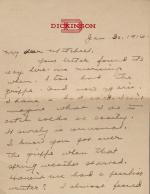
An unknown student at Dickinson College writes to a Mitchell about the winter and getting ready for the fraternity dances that take place in February.

James Smith, a signer of the Declaration of Independence as a representative of Pennsylvania, writes to Frederick Muhlenberg and complains that Mr. Lyon refuses to pay for cattle purchased to feed the troops at Carlisle. Transcript included.
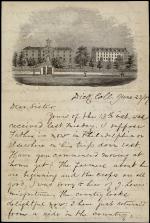
Thomas Griffith, a member of the Class of 1858, writes to his sister about his semester at Dickinson College. Griffith writes about some of his friends, health, as well as his studies.

Former Pennsylvania Representative Andrew Boden asks John Boyle, an attorney at the US Navy Office in Washington, to “procure for me” a copy of “the secret minutes of the convention, which framed the U. S.

John Gilmore, class of 1856, writes to his sister and discusses his life as a student at Dickinson College.

Thomas Williams (Class of 1825) writes to Carlisle lawyer C. B. Penrose, discussing local election results in the Pittsburgh region. Transcript included.
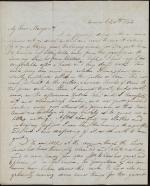
John Zug (Class of 1837) writes to his wife, Margaret Hood, updating her on the farmhouse and the lives of their friends. Transcript included.
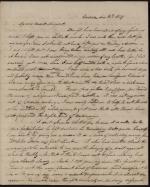
John Zug (Class of 1837) writes to his girlfriend, Margaret Hood, and describes his first days of work as a lawyer.

Horatio Collins King's diary during the spring of his senior year at Dickinson College. King is a member of the class of 1858. Transcript included.

Horatio Collins King's diary during the fall of his senior year at Dickinson College. King is a member of the class of 1858. Transcript included.

Horatio Collins King's diary during the spring of his third year at Dickinson College. King is a member of the class of 1858. Transcript included.

Horatio Collins King's diary during the fall of his third year at Dickinson College. King is a member of the class of 1858. Transcript included.

Horatio Collins King's diary during the spring of his second year at Dickinson College. King is a member of the class of 1858. Transcript included.

Horatio Collins King's diary during the fall of his second year at Dickinson College. King is a member of the class of 1858. Transcript included.

Horatio Collins King's diary during the spring of his first year at Dickinson College. King is a member of the class of 1858. Transcript included.

Horatio Collins King's diary during his first semester as a student at Dickinson College. King is a member of the class of 1858. Transcript included.

An anonymous author writes this essay on the history of Dickinson College, which is published in The Port Folio, vol. 5 (March 1811): 239-246. This essay is published with B.
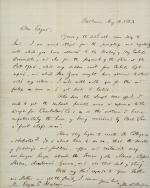
John Keagy Stayman questions Edgar E.